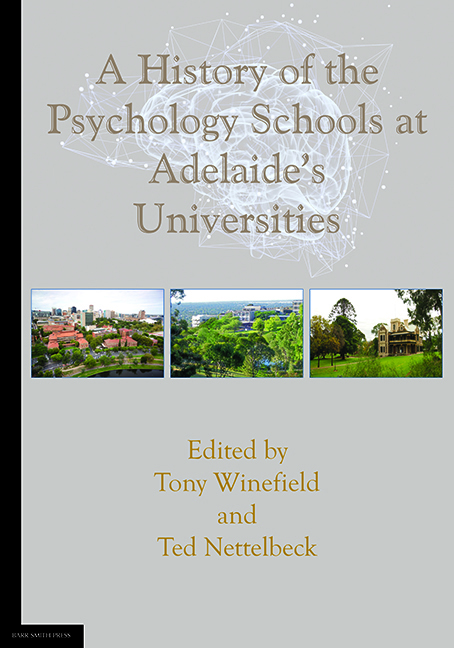Book contents
- Frontmatter
- Contents
- List of contributors
- Preface
- 1 Introduction
- 2 The origins and early history of the University of Adelaide's School of Psychology
- 3 The later years
- 4 Teaching applied psychology at the University of Adelaide: A personal view
- 5 Flinders University: Psychology in the twentieth century
- 6 Recent history of Flinders School of Psychology
- 7 The history of Psychology at the University of South Australia: From little things big things grow
- 8 The history of Psychology at the University of South Australia: Recent history
7 - The history of Psychology at the University of South Australia: From little things big things grow
Published online by Cambridge University Press: 25 July 2017
- Frontmatter
- Contents
- List of contributors
- Preface
- 1 Introduction
- 2 The origins and early history of the University of Adelaide's School of Psychology
- 3 The later years
- 4 Teaching applied psychology at the University of Adelaide: A personal view
- 5 Flinders University: Psychology in the twentieth century
- 6 Recent history of Flinders School of Psychology
- 7 The history of Psychology at the University of South Australia: From little things big things grow
- 8 The history of Psychology at the University of South Australia: Recent history
Summary
Part 1: The birth and development of the School of Psychology (1994-2005)
The birth of the School of Psychology at the University of South Australia on 1 January 1994 was the formal result of some four years of intensive political efforts by a small group of highly dedicated academic individuals. Lobbying to establish a home for psychology commenced even before the agreement to merge two precursor higher education institutions — the South Australian Institute of Technology [SAIT] and some campuses of the South Australian College of Advanced Education [SACAE] — was signed and then ratified by the State Parliament to create the University of South Australia Act 1990 (SA). The university commenced on 1 January 1991.
Background
Prior to 1989, although a number of psychology-educated lecturing staff had been working, teaching students and researching in the precursor institutions, the main problem was that psychology was regarded as a ‘captive’ discipline. It existed in these institutions only to ‘service’ other professions, such as social work, teaching, business, communication, physiotherapy and other health science professions. As a consequence, many lecturers interested in advancing knowledge in the discipline found their academic, teaching and research activities stifled and even prevented by the requirements of the institutions’ academic units, which were often multidisciplinary and professional schools. Much of the time, there were non-psychology academics who determined what areas of psychology should be considered and taught, assessed and researched, all justified ostensibly by the requirements of whatever professions were taught by that school.
There were two exceptions to this. First, at the Magill and Salisbury campuses of SACAE, over the years there had developed two psychology ‘majors’ within undergraduate degrees in teaching, communication and liberal studies, primarily through the efforts of psychology academics Colin Parsons, Russell Hawkins, Gary Childs and several others — although neither of these majors had ever been eligible for accreditation by the Australian Psychological Society [APS]. In 1994, these majors were to become the basis for the new School of Psychology's accredited sequence in a ‘named’ undergraduate psychology degree.
- Type
- Chapter
- Information
- A History of the Psychology Schools at Adelaide's Universities , pp. 183 - 194Publisher: The University of Adelaide PressPrint publication year: 2016



